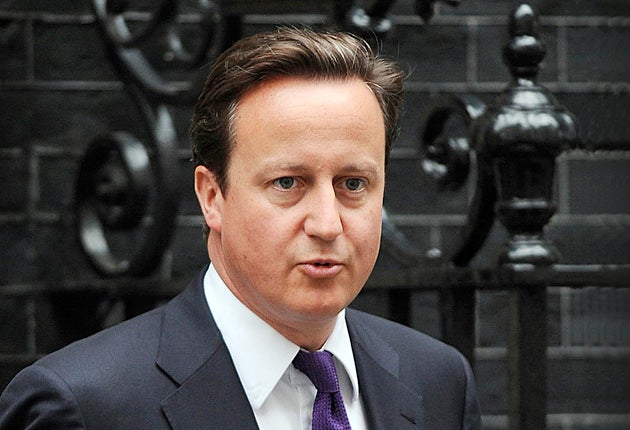Riots: the political battle lines are drawn
David Cameron blames children without fathers and schools without discipline, while Ed Miliband blames bankers and MPs for failing to set a better example for society

David Cameron and Ed Miliband will today set out contrasting views about the causes behind last week's rioting and the solutions needed to fix them, as the debate over what led to the outbreaks of mass civil unrest moved from one about policing to one concerning politics in general.
Click HERE to view graphic (215k jpg)
Mr Cameron will use a speech this morning to address what he describes as the "slow-motion moral collapse" of parts of British society over the past few generations. He will promise to review all areas of government work on schools, welfare, parenting and communities to address the "attitudes and assumptions" that have brought parts of the country to a "shocking state".
At the same time, Mr Miliband will use a speech at his old school – Haverstock School in Chalk Farm, north London, close to where some of the rioting took place on Monday night – to suggest it is not just the bottom of society that is to blame, but examples set by people with money and power as well. He will single out bankers' pay and MPs' expenses as instances of the breakdown in standards which have seen "greed, selfishness and immorality" become the norm.
The speeches come as:
* The court system continued to struggle under the weight of cases coming before it. The Metropolitan Police has so far made 1,414 arrests in connection with the violence and charged 810 alleged perpetrators.
* The row between senior police and ministers showed no sign of dying down. Yesterday the Chief Constable of the West Midlands became the latest senior officer to criticise ministers.
* Around 5,000 people attended a peace rally in Birmingham in the area where Haroon Jahan, Shazad Ali and Abdul Musavir were run down and killed. A 26-year-old man and a teenager have been charged in connection with their deaths.
Both leaders' speeches today – and an address that Nick Clegg will give tomorrow – will set the political battleground ahead of the party conference season next month. Mr Miliband is expected to portray the Prime Minister as responding to the riots with "knee-jerk gimmicks" that have not been properly thought through, and to restate his call for a public inquiry.
In contrast, Mr Cameron will attempt to reassert his party's law-and-order credentials, blaming the last Labour government for many of the policies that have damaged society. Mr Clegg is likely to argue there is a danger that underlying problems are ignored after the initial flurry of media attention.
All three are attempting to appeal to large sections of the public described by Mr Miliband as the "squeezed middle". Mr Cameron has attempted to capture the same constituency through his idea of the Big Society. Party strategists know these voters will be critical in determining who wins the next election.
In his speech, Mr Cameron will say the rioting has been a "wake-up call" for the country. "Social problems that have been festering for decades have exploded in our face," he will say.
"We must fight back against the attitudes that have brought parts of our society to this shocking state. Irresponsibility. Selfishness. Behaving as if your choices have no consequences. Children without fathers. Schools without discipline. Reward without effort. Crime without punishment. Rights without responsibilities. Communities without control.
"Some of the worst aspects of human nature tolerated, indulged – sometimes even incentivised – by the state and its agencies."
Mr Cameron will say that his plan for the Big Society is capable of dealing with a "broken society". He will say: "I and ministers from across the Government will review every aspect of our work, on schools, welfare, families, parenting, addiction, communities, on the cultural, legal, bureaucratic problems, too; from the twisting and misrepresenting of human rights that has undermined personal responsibility to the obsession with health and safety that has eroded people's willingness to act according to common sense."
Mr Miliband will draw parallels in his speech between what he describes as the "feral underclass" responsible for the rioting and bankers who award themselves million of pounds in bonuses. He will call for an end to the "me-first, take-what-you-can attitude" that has eroded all levels of society.
"We must be honest with ourselves. The greed, selfishness and gross irresponsibility that shocked us all so deeply is not just confined to what is being portrayed as a feckless and feral underclass," he will say. "The bankers who took millions while destroying people's savings: greedy, selfish, immoral. The MPs who fiddled their expenses: greedy, selfish, immoral.
"To tackle the values crisis in our society, we need those at the top to start behaving better, too. When we talk about the sick behaviour of those without power, let's also talk about the sick behaviour of those with it."
In a direct attack on Mr Cameron, the Labour leader will also accuse the Prime Minister of turning his back on examining the connections between circumstances and behaviour and resorting to "knee-jerk" policies to appease the Tory right.
"Five years ago he thought deprivation as well as culture both mattered. But now he says: 'This is not about poverty; it is about culture'.
"I don't understand why he has changed his mind. The world hasn't changed. Maybe it isn't his view of the world that has changed, but his view of what would make him popular that has changed."
Subscribe to Independent Premium to bookmark this article
Want to bookmark your favourite articles and stories to read or reference later? Start your Independent Premium subscription today.
